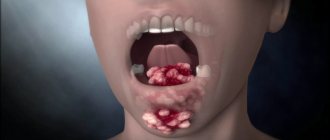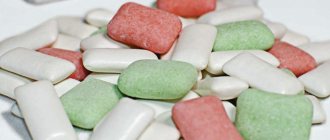Garlic and onions are used as food additives; they have a bright taste and aroma, and contain a large amount of useful microelements and vitamins. In addition, regular consumption of these foods is good for health: they strengthen the immune system, reduce the likelihood of developing cancer, and are used as therapy for mycosis. Unfortunately, garlic and onions can cause a specific unpleasant odor from the mouth. In the body, the sulfide compounds present in these products are metabolized into allyl methyl sulfide - this is what causes the “aroma”. In this article we will tell you how to get rid of garlic breath.
How to get rid of garlic breath?
Diagnosis of diseases by smell
We recognize the disease by the smell of the mouth: what does this symptom tell us?
Bad breath is not just an aesthetic drawback. This is an alarm signal that indicates that not everything is in order in the body. What symptoms should you be wary of?
oral irrigator, smell, mouth breathing, oral cavity
The cause of bad breath can be diseases of the stomach, and pathology of the ENT organs, but most often - diseases of the teeth and other organs of the oral cavity. First of all, you need to pay attention to the tongue; it is no coincidence that doctors call it the “mirror of the stomach.” A thick coating of white or yellow color indicates trouble in the digestive system and can itself be a source of an unpleasant odor. In this case, it is important to visit a gastroenterologist - he will prescribe a certain diet and advise you to brush not only your teeth, but also your tongue.
Why is beets urine red?
Indeed, after you eat this vegetable, the effect of bituria may appear, that is, the urine will turn red. However, beets do not affect everyone in this way. I wonder what substances underlie this effect and why it is not universal?
It is not surprising that the same substances that give beets their color also turn urine red. Beets are dark red due to the presence of a class of substances called betacyanins.
This group includes a large number of substances with similar chemical structures. Betanin plays a major role in the coloring of beets; in addition, it is extracted from beets and used as a food coloring (it is called “beet red” and is designated as food additive E162).
Beets also contain a family of compounds called betaxanthins. In their pure form, they are yellow in color and are present in beets in lower concentrations than betacyanins.
Betacyanins can cause bituria because some people's digestive systems do not break them down. The reason for this is not entirely clear.
It is assumed that these substances are destroyed at low pH levels of gastric juice, that is, when its acidity is low, this does not happen. These substances can pass through the digestive system, be absorbed through the walls of the colon and enter the bloodstream, and then they are filtered by the kidneys and excreted from the body along with urine. Of course, some undigested substances may remain in the large intestine and give an unexpected effect - purple poop.
It is likely that the breakdown of these substances is also influenced by genetic factors that have not yet been precisely determined. For example, if a person is genetically characterized by high acidity of gastric juice, he breaks down substances more efficiently, and then bituria does not occur. According to another opinion, bituria is associated with an indicator of hemochromatosis (excessive accumulation of iron in the body).
And another version: we are all susceptible to bithuria to some extent. One study found that chemical pigments in beets were found in the urine of all subjects tested, but only some had concentrations high enough to cause noticeable coloring.
What does your breath smell tell you?
With chronic gastritis with low acidity, the digestion of protein substances slows down. Taking gastric juice and enzyme preparations will help get rid of the odor that accompanies this disorder. Bad breath is one of the symptoms of esophageal diverticulum (pouch-like protrusion of the wall of the esophagus). A sour odor is possible with peptic ulcers of the stomach and duodenum with increased acidity of gastric contents. Specific odors should be alarming: the smell of acetone (characteristic of a diabetic coma), ammonia (a sign of kidney failure), putrefactive odor (noted with a lung abscess or bronchiectasis, as pus accumulates in the dilated areas of the bronchi).
Oral diseases and bad odor
As a rule, bad breath accompanies gum disease, the presence of dental plaque, and interdental pockets. Teeth affected by tooth decay can also cause bad breath. Often the stench during the preparation of a carious tooth is so strong that the doctor is forced to change the protective mask. If the patient has so-called pockets - pathological depressions in the interdental spaces, then food debris usually gets stuck in them. It is almost impossible to remove them yourself, so the process of rotting begins. It is accompanied by pain, inflammation and, naturally, odor. No amount of toothpaste will help here. It is necessary for the dentist to “clean out” everything from the pockets and provide treatment to promote their complete healing.
How can the dentist help?
Removing tartar It happens when just removing tartar is enough to make bad breath disappear. The fact is that tartar is saturated with pathogenic microorganisms, which not only cause inflammation of the gum tissue, but also smell very unpleasant. In cases where the smell is associated with diseases of the hard tissues of teeth or gum tissue, it is necessary to carry out sanitation, that is, complete improvement of the oral cavity, and the problem will be solved. Treatment of diseases of the salivary glands However, there are situations when bad breath has a more complex cause.
For example, with some diseases of the salivary glands, the required amount of saliva does not enter the oral cavity or the saliva is too viscous. This leads to disruption of the self-cleaning processes of the oral cavity, which is accompanied by a bad odor. In this case, only a doctor will give specific recommendations.
Causes of strong garlic odor
It is the smell of garlic that stimulates the appetite, and we have a desire to eat dishes that contain this spice. When chewed, garlic mixes with saliva, causing a reaction accompanied by an unpleasant and persistent odor.
Important ! It can be almost impossible to get rid of it until several hours later, the smell loses its attractiveness.
Let's figure out why this happens.
Garlic and onions contain substances such as phytoncides - these are microelements that have bactericidal properties. Phytoncides are indispensable for the prevention of viral diseases during the cold season. It is because of them that garlic has been used in folk medicine since ancient times. However, these substances emit virtually no odor; other compounds are responsible for the pungent aroma.
Eliminating garlic odor is never easy
A strong garlic odor is released when the mechanical integrity of the head of garlic is broken - you may notice that a whole clove does not smell so intensely. Accordingly, we can conclude that the required substances are contained in the juice or other components of this root crop, which are released when it is damaged.
The fact is that the alliinase enzymes contained in garlic react with alliin, and a new compound is obtained - allicin. It has a specific garlic smell. When this substance breaks down during digestion, hydrogen sulfide is additionally released, which gives an unpleasant odor after eating garlic.
Gargling with herbal decoction
For diseases of the oral mucosa, rinsing with infusions and decoctions of medicinal herbs has long been used in folk medicine: along with their anti-inflammatory effect, they have a good deodorizing effect. Chamomile, sage, wild strawberry leaves, calendula, St. John's wort, and mint are especially suitable for these purposes. Usually the herb (separately or a mixture of several types) is brewed at the rate of 1 tablespoon per 1 glass of boiling water, infused, and squeezed. Half a glass of warm infusion is enough for one rinse. It is better to do this after eating and after you have first removed all food debris with a toothpick and then with a toothbrush with paste or powder.
What else will help?
Gastrointestinal diseases are often accompanied by excessive gas formation in the intestines. This further increases bad breath. The same herbs will help to “pacify” fermentation processes. Only they need to be taken orally as carminatives. Dill, parsley, caraway seeds, anise, peppermint, lemon balm and sage have this property. It is recommended to rinse your mouth several times with 3/4 cup of a warm infusion, such as mint infusion. If the bad odor is associated with digestive disorders, taking activated carbon is useful - 1 tablet 3 times a day after meals.
Garlic: beneficial and harmful properties
Garlic contains a large amount of minerals and vitamins, as well as substances that have a beneficial effect on the immune system, but it is not suitable for everyone, and when consuming it you need to observe moderation. Of course, it is contraindicated for those who suffer from allergic reactions to garlic.
Garlic is quite useful: consuming it helps prevent colds and flu
Beneficial features.
- In its raw form, garlic contains the maximum concentration of nutrients, however, its smell in its raw form is much more intense.
- Garlic is indispensable for the prevention of acute respiratory infections, intestinal infections and flu.
- Has a beneficial effect on cartilage tissue in joints.
- Effectively reduces blood pressure and dilates blood vessels.
- It has a beneficial effect on potency in men and is used in the treatment of prostatitis.
Garlic may have the following adverse effects.
- May cause irritation of mucous membranes in people suffering from gastrointestinal pathologies. People suffering from acute gastritis and stomach ulcers should be especially careful - it is better for them to completely avoid eating garlic, as well as other hot spices.
- Large amounts of garlic can cause headaches, and in rare cases, even provoke an epileptic attack.
- It is recommended to limit garlic consumption as much as possible during pregnancy and breastfeeding. Any spices and spices with a pronounced taste and smell can provoke allergic reactions in newborns.
Garlic, however, can also negatively affect the functioning of the body.
Garlic should not be consumed in large quantities; it can cause exacerbations of some chronic diseases, especially those related to the digestive system.
Important ! The optimal amount is no more than 1-2 cloves of garlic per day.
General recommendations
Daily oral hygiene Fresh breath directly depends on how carefully and thoroughly you perform routine hygiene procedures. Alas, it has not yet become a rule for everyone to brush their teeth for several minutes in the morning and evening in all directions with an elastic brush and paste, and after each meal to rinse their mouth with warm water. Choosing a toothpaste Dentists recommend choosing toothpastes that contain fluoride, calcium (this will strengthen tooth enamel), and extracts of medicinal herbs that relieve inflammation of the oral mucosa and eliminate unpleasant odors. The benefits of rinses Mouth rinses with elixirs with deodorizing substances are especially good at refreshing your mouth during the day. After eating a sandwich or candy in a hurry, it is not always possible to rinse your mouth; in this case, chewing gum will help.
An oral irrigator is a modern hygiene product that cleans interdental pockets and spaces by spraying a powerful jet of liquid. A stream of solution cleanses the periodontal folds, washes away food debris, improves blood circulation in the gums and massages them, preventing the formation of plaque and bad breath.
Expert: Galina Filippova, general practitioner, candidate of medical sciences Author: Anastas Badis, dentist
The material uses photographs belonging to shutterstock.com
Why do beans cause flatulence?
The gas-causing properties of legumes require no introduction. It is well known that consuming even a small portion of beans can have the most undesirable consequences. The reason is the chemical composition of beans and its metamorphosis in our intestines.
Beans contain a special type of sugar called oligosaccharides. It is a type of polysaccharide - molecules formed by long chains of saccharides or sugars. (Examples of monosaccharides are fructose, glucose and dextrose.)
The types of oligosaccharides most present in beans are raffinose and stachyose. These are very large molecules and are difficult to digest. The enzymes in our digestive system that are responsible for breaking down food cannot make it small enough to be absorbed through the walls of the small intestine. So, when you eat a serving of beans, they most likely end up in your large intestine without ever forming into a fine suspension.
When they reach the large intestine, they will encounter a huge number of bacteria inhabiting it, often referred to as intestinal flora. These bacteria successfully do the work that the digestive system cannot do and destroy any oligosaccharides that enter the colon.
When bacteria do their job, they produce a variety of gases, including carbon dioxide and hydrogen. This eventually leads to the formation of hydrogen sulfide (as well as methanethiol and dimethyl sulfide): an extremely foul-smelling chemical that can be found in human intestinal gas.
Beans are not the only vegetable that causes flatulence. Onions, garlic, cauliflower and Brussels sprouts are among many other vegetables that contain oligosaccharides or polysaccharides that our digestive system has problems with.
So how can this effect be reduced? One suggestion is to soak the beans before cooking. This method will not work with beans in tomato sauce, which is what you buy in cans. But with other beans, this technique will help destroy some of the oligosaccharides. However, you can only reduce them by 25%, so you won’t be able to completely prevent the problem.



